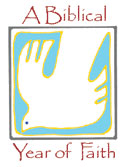Official Website of the
Catholic Diocese of Little Rock
Prophets call us to love God, neighbor
Published: April 13, 2013
This is the seventh column in a 14-part series
By Cackie Upchurch
Director of Little Rock Scripture Study
When asked by the Pharisees to identify the greatest commandment, Jesus responded by quoting two laws from Israel's earliest tradition: love of God, from Deuteronomy 6:5, and love of neighbor, from Leviticus 19:18. (See Matthew 22:34-40 and Mark 12:28-31.) By putting these two laws on equal footing Jesus illustrated, as Israel's prophets did before him, that devotion to God was empty without love of neighbor and that love of neighbor meant little without embracing God.
 As a son of Israel, Jesus would have been steeped in the traditions of his ancestors. The stories of the patriarchs and matriarchs would have shaped his childhood, as would praying the Psalms and listening to the challenging words of Israel's prophets. The holy family, like most families in Palestine, would surely have been familiar with Israel's history of making and breaking covenant with God, only to renew the covenant once again.
As a son of Israel, Jesus would have been steeped in the traditions of his ancestors. The stories of the patriarchs and matriarchs would have shaped his childhood, as would praying the Psalms and listening to the challenging words of Israel's prophets. The holy family, like most families in Palestine, would surely have been familiar with Israel's history of making and breaking covenant with God, only to renew the covenant once again.
Love of God and love of neighbor are the core twin teachings found in the writings of the 16 named prophets in the Old Testament. Their writings reflect the period of the eighth through fifth centuries B.C. Within this prophetic tradition we find some of the most challenging words of Scripture, alongside some of the most uplifting.
As scholar Walter Brueggemann says, the way of the prophet is to both criticize and energize, based solely on how closely God's people walk in the ways of the covenant God to whom they have pledged their faithfulness.
God is the great liberator who shaped his people in the desert and led them to a new land where their tribal and nomadic lifestyle was transformed into a nation state of farmers and craftspeople. The ten commands from the Mount Sinai encounter between God and Moses call for a healthy way of living with God (the first three commands) and with others (the final seven commands).
The challenges of living in this newfound freedom, establishing a national identity and shaping daily interactions created a larger body of laws intended to reflect God's will in the community. The laws that emerged in these early generations among the people of Israel are enshrined in 613 mandates found largely throughout the Pentateuch (Genesis, Exodus, Leviticus, Numbers and Deuteronomy).
While this number may sound overwhelming, the original motive was the desire to shape a community which embodied God's presence in the world. Over time, and in the midst of always shifting geopolitical power struggles in the region, the people of God found themselves forgetful. Some strictly obeyed the laws of worship but ignored or forgot the plight of their brothers and sisters. Others forgot the single-hearted devotion they were called to and dabbled in foreign alliances. Some simply forgot their obligations to one another in community.
The prophets of Israel served to remind God's people in ancient times of the covenant their ancestors had accepted with full hearts as they wandered in the desert (see Exodus 19:1-8; 24:3-8). Every generation needs that reminder and so the words of the ancient prophets also are words for us today.
The biblical prophets spoke on God's behalf. They were not seers in any popular sense. They did not read tea leaves or crystal balls. Their "predictions" could more accurately be called consequences. Based on the evidence of how closely or how loosely God's people were aligned with the covenant, they spelled out the inevitable results. They spoke from an intimate relationship with God.
Authentic worship and avoidance of foreign alliances was a way of expressing love for God (see Isaiah 30:1-7; Hosea 4:1-6; 6:4-6). Even properly celebrated rituals were empty gestures without loving one's neighbor (see Micah 6:6-8). This kind of love was to be carried out in the most practical ways by caring for widows and orphans, dealing justly in business and living in a spirit of mercy (see Isaiah 1:10-17; Amos 5:21-24).
The prophets were never popular, primarily because they named the sins of their people and spelled out the consequences: destruction, loss of national status, punishment in exile, purging through historical events that would not favor them. But they also described in lavish metaphors the fruits of repentance: the abounding mercy and justice of God, the renewal of God's covenant and the forgiveness of sins (see Jeremiah 3:11-18; 31:7-14; Hosea 14:2-9; Micah 7:18-19).
It is little wonder that we see in Jesus the profound influence of the prophetic tradition and with him, seek to live in justice and mercy.
Study Questions
- After reading the passages identified in the first paragraph above, how would you describe the influence of religious upbringing in Jesus' own ministry?
- When have you heard or read challenging words from Scripture or Church teaching that were hard to swallow? What steps can you take to open yourself to being more receptive of difficult teachings?
- What events in your life or the life of your family have illustrated to you the profound connection between love of God and love of neighbor?
- Review the passages identified in this article from the writings of the prophets. Which of them do you find yourself pondering more deeply? Why?
This article was originally published in Arkansas Catholic April 13, 2013. Copyright Diocese of Little Rock. All rights reserved. This article may be copied or redistributed with acknowledgement and permission of the publisher.









